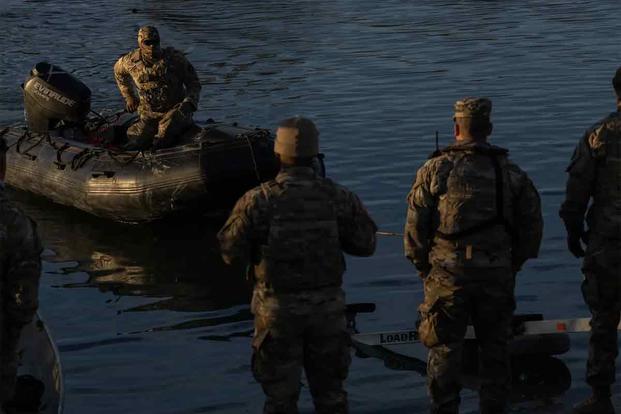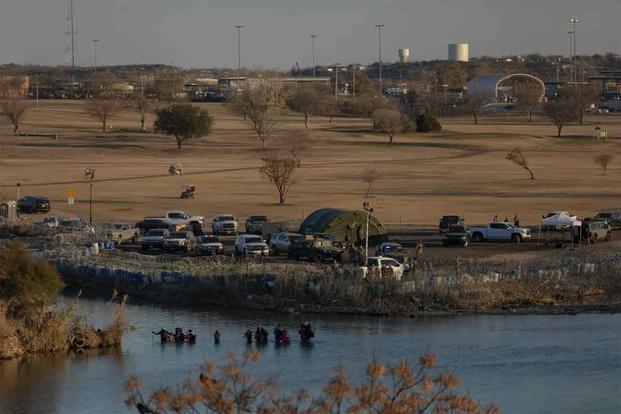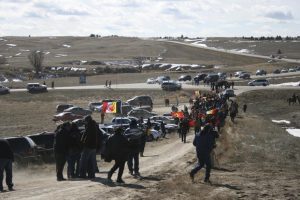This article was first published by The Texas Tribune, a nonprofit, nonpartisan media organization that informs Texans — and engages with them — about public policy, politics, government and statewide issues.
EAGLE PASS — On a chilly January afternoon, a military drone hovers over Shelby Park as Texas National Guard members pull boats from the Rio Grande and slide them onto trailers. Shipping containers topped with concertina wire line the riverbank, where men in fatigues erect a bilingual sign near the boat ramp that reads:
No migrant processing at this location. Please proceed to nearest port of entry for processing with U.S. Border Patrol.
The entire 47-acre park, including the golf course, is enclosed with concertina wire and patrolled by state troopers from Texas and Florida. At the entrance, behind a chain-link fence, three National Guard members lean against a green humvee, strapped with rifles.
“It looks like a war zone in a third-world country,” said real estate agent and Eagle Pass resident Carlos Herrera, who lives nearby with his wife and baby daughter.
No one can enter this city park without asking permission — soldiers let two journalists pass and wander around the park last week. But U.S. Border Patrol agents are strictly prohibited from the park grounds, according to the U.S. Department of Justice.
The park has turned into a battleground in an escalating legal fight between the Biden administration and Gov. Greg Abbott, who for the past three years has convinced state lawmakers to spend more than $10 billion in an attempt to deter hundreds of thousands of migrants who have crossed the Rio Grande into Texas, many of whom are seeking asylum.
Caught in the middle are residents of this mostly Mexican American town of 28,000 residents, some who say they feel helpless after the state seized their park. Revenue-generating events like Noches Mexicanas, an annual family event with live music and vendors, that are scheduled for the spring in Shelby Park may be canceled.
“If you ask every citizen here in Eagle Pass, if you talk to them, they’re going to tell you, they wish everything would go back to normal,” Herrera said. “They wish we can have our event at Shelby Park like we do every year for the past 20 years. But can we do anything about it at this point? I don’t think so.”
During the Trump administration, there were also large increases in migrant apprehensions at the U.S.-Mexico border. But when President Biden took office in 2021 and began canceling some Trump policies, Abbott launched an effort that put the state on a collision course with the federal government over immigration enforcement.
Under federal law, the federal government has sole authority to enforce immigration laws — a power that’s been affirmed by Supreme Court decisions.
But since March 2021, Abbott, under the banner of an effort he dubbed Operation Lone Star, has sent state troopers and National Guard members to different parts of the 1,200-mile Texas-Mexico border; ordered state police to arrest migrants on suspicion of trespassing; lined the river at Shelby Park with shipping containers; ordered 70,000 rolls of concertina wire to be deployed along 29 miles of the river in Maverick County, which includes Eagle Pass; and erected about a dozen miles of border walls in different parts of the border at a price of $1.5 billion.
And late last year, the state Legislature passed a bill, which Abbott signed and is scheduled to take effect in March, that allows police to arrest people they suspect of illegally crossing the Texas-Mexico border on state charges. The American Civil Liberties Union and other groups have filed lawsuits aimed at overturning the new law.
Texas has also filed various lawsuits attacking the Biden administration’s immigration policies.
One Texas lawsuit, filed against the federal government after Border Patrol agents began cutting through the state’s concertina wire to apprehend or give medical aid to migrants, is now before the U.S. Supreme Court, which must decide whether Texas is illegally preventing Border Patrol agents from apprehending migrants who have crossed the border illegally.

The current standoff at the border is unique in American history, according to academics who study the U.S.-Mexico border and immigration.
Jaime Aguila, a history and immigration professor at Midland College in Texas, said a similar state-versus-federal legal confrontation happened after Arizona passed a state immigration law in 2010 that required immigrants to carry their immigration papers at all times and allowed local police to arrest suspected undocumented immigrants.
But Aguila said that battle played out in court and not on the ground.
“It’s become common for the federal government to have a political standoff with states over immigration policy, but what we’re seeing in Eagle Pass is out of the ordinary,” said César Cuauhtémoc García Hernández, an immigration attorney and law professor at Ohio State University. “I don’t know of any instances in which federal law enforcement officers have faced off against state police or troops because of a disagreement over immigration policy.”
Dispute over drowning response
The tension between the Border Patrol agents who have guarded the border alone for generations and the recently-arrived state forces has ramped up.
On Jan. 12, National Guard members at the park blocked a Border Patrol agent from accessing the river after three migrants drowned while crossing the Rio Grande and two other migrants were still struggling in the water, according to a court filing by the U.S. Department of Justice.
According to the filing, Mexican immigration officials alerted Border Patrol agents at 9 p.m. that night that two migrants were in distress on the American side near the boat ramp at Shelby Park. An hour earlier, a mother with two children drowned in the same area, according to the DOJ. When a supervising Border Patrol agent told National Guard troops at the park gate about the migrants in distress, one of them responded that they had orders to deny Border Patrol entry.
The Border Patrol agent asked to speak with a National Guard supervisor, who told the agent that “Border Patrol was not permitted to enter the area even in emergency situations,” according to the court filing.

Since then, National Guard has given Border Patrol access to the boat ramp at the park, but they have to give their names, and the time they entered the park is recorded, according to a statement by Robert Danley, lead field coordinator for U.S. Customs and Border Protection for the Del Rio area, that was filed with the Supreme Court.
The state has denied the Justice Department’s version of events, saying that the supervising agent who alerted National Guard members at the gate about the drownings didn’t indicate it was an emergency and that “Mexican officials had the situation under control,” according to a court filing by Attorney General Ken Paxton’s office with the Supreme Court.
“Texas has conducted a diligent investigation into these allegations that refutes Defendants’ dire accusation,” the court filing says. “Based on that investigation, the two Border Patrol agents who approached the gate on January 12 did not ask for admission to Shelby Park to respond to an emergency, nor did they advise either the Guardsmen or the Staff Sergeant that any ‘emergency’ situation existed.”
The DOJ said a Mexican search and rescue team recovered the bodies of the three victims, Victerma de la Sancha Cerros, 33; Yorlei Rubi, 10; and Jonathan Agustín Briones de la Sancha, 8. The mother and children were from the state of Mexico and were trying to cross the border to escape drug cartel-related violence, National Public Radio reported.
The two other migrants were rescued by Mexican authorities, the DOJ said.
Residents torn about state presence
Eagle Pass residents are torn about the large state presence in their town. Lots of locals work for U.S. Customs and Border Protection, which oversees Border Patrol and the federal agents who manage the international bridge connecting the city to Piedras Negras, Coahuila.
Maverick County is among the poorest counties in the state, with 23% of residents living below the poverty line, significantly higher than the statewide rate of 14%.
Some say they appreciate the extra law enforcement to help manage the historically high number of immigrants crossing the border — in the Del Rio sector, which includes Eagle Pass, federal agents recorded more than 393,000 migrant encounters in fiscal year 2023, which ended in September. That’s about 88,000 fewer encounters than the previous fiscal year, but still a 52% increase from fiscal year 2020.
Still, they lament that it means having a militarized park.
Amerika García Grewal, 47, said she is alarmed by Abbott’s tactics and worries the park may not reopen to residents because not enough people have raised their concerns publicly.
“If we don’t say, ‘My rights are being trampled on,’ we’re going to lose them,” she said, walking past a mobile command center in the park’s parking lot.
Her father, Mike García, 74, who voted for Abbott and former President Donald Trump, said he disagrees with his daughter’s politics, but does agree that the governor’s tactics are too aggressive.
“I think it’s a publicity stunt, I think it’s a trick. I think it was intended to garner attention,” he said, sipping coffee at a local Burger King. “Has it been successful? Yes, it has. Do people know about the border, know about Eagle Pass? Kind of ill-gotten fame. But yep. It’s brought attention to the border.”
At the golf course, which remains open, Raymundo Alejandro, 18, sat on a bench on a recent sunny weekday, waiting for his high-school classmates to start golf practice, something he does four days a week.
He said he was surprised to see soldiers in the park and the concertina wire wrapping around the golf course. While he would prefer that migrants enter the country legally, he said understands it’s challenging because of the lack of legal pathways and he thinks the state’s response is unnecessary.
“We’re all people at the end of the day, some better than others, but we’re all just trying to live,” he said.
Annual festival could be canceled
Herrera, the real estate agent, is among the organizers of Noches Mexicanas, which he said is the largest event that takes place at Shelby Park. It features live regional Mexican music, food, a carnival and local vendors. It attracts thousands of people each year in March, he said.
Herrera said the nonprofit that organizes it uses profits from alcohol sales and fundraisers to give scholarships to local high school students, pay medical bills for older residents and other charitable causes — such as helping a family whose house burned down.
But this year, the event may not take place, he said, because of the state’s occupation of the park.
“We have to figure out where we’re going to be having the event. And if it’s even worth having it in a different location,” he said, sitting on a bench outside his apartment, a two-story brick building in downtown Eagle Pass. “It’s really jeopardizing the way we’ve always been doing it for more than two decades.”
But, he said he supports the state sending reinforcements so that local law enforcement can focus on day-to-day emergency calls while the state focuses on migrants. He said he sees moving the event or canceling it as a sacrifice for public safety.
“Would I like Shelby Park to be open for our event? Yes. Do I think it’s going to be possible? Possibly not. But at the end of the day, what can we do?” he said
“This is not something that we wanted”
That’s a sentiment that the Eagle Pass City Council expressed last week. During a three-and-a-half hour public meeting at City Hall, the four-member council voted against taking any legal action against the state to try to reclaim the park.
During the public comment period, only two people spoke, including García Grewal and Juanita Martinez, the Maverick County Democratic Party chairperson.
“I’ve heard you say, mayor, that you are not in agreement about what’s going on with Shelby Park,” Martinez said, standing on a podium to address the council. “But from the very beginning, you’ve been welcoming. That is why this is happening in our city. We need a strong city government that’s gonna fight back and retain our autonomy against the state.”
Mayor Rolando Salinas declined to be interviewed.
In June, Salinas agreed, without the City Council’s approval, to a DPS request to declare the park private property so state troopers could arrest migrants who entered the park for trespassing. After residents complained about Salinas’ move, the City Council — including Salinas himself — voted to rescind the original agreement with DPS.
Last week, Salinas said he didn’t ask for this.
“That is not a decision that we agreed to. This is not something that we wanted. This is not something that we asked for as a city,” he said in video posted on Facebook.
After a three-hour executive session behind closed doors, the council voted not to take legal action. Council members said they’re angry about the state takeover, but the city can’t afford to spend taxpayer money on a legal fight with the state.
“We need to fight, but we need to be smart about it. And as city representatives we’d love to proceed legally,” council member Monica Cruz said to a mostly empty room. “We feel as frustrated, as tired and mad about this whole situation as you do.”
Disclosure: Facebook has been a financial supporter of The Texas Tribune, a nonprofit, nonpartisan news organization that is funded in part by donations from members, foundations and corporate sponsors. Financial supporters play no role in the Tribune’s journalism. Find a complete list of them here.
This article originally appeared in The Texas Tribune
Sign up for The Brief, The Texas Tribune’s daily newsletter that keeps readers up to speed on the most essential Texas news.
The Texas Tribune is a member-supported, nonpartisan newsroom informing and engaging Texans on state politics and policy. Learn more at texastribune.org.
Story Continues
© Copyright 2024 The Texas Tribune. All rights reserved. This material may not be published, broadcast, rewritten or redistributed.
Please rate this CIBA article
Vote






